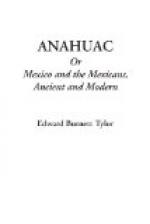We were a strange mixture on board the ‘Atrato’, over two hundred of us. Peruvians and Chilians from across the isthmus, Spaniards and Cubans, black gentlemen from Hayti, French colonists from Martinique, but English preponderating above all other nationalities. One or two governors of small islands, with their families, maintaining the dignity of Government House, at least as far as Southampton, and unapproachable by common mortals. Army men from West India stations, who appeared to spend their mornings in ordering the wine for dinner, and their evenings in abusing it when they had drunk it. West India planters, who thought it was rather hard that the Anti-slavery Society, after ruining them and their plantations, should moreover insist on their believing themselves to be great gainers by the change. We were all crowded, hot, and uncomfortable, and showed our worst side, but as we neared England better influences got the ascendant again.
It was pleasant to breathe a cooler air, and to feel that I was getting back to my own country and my own people; but with this feeling there was mixed some regret for the beautiful scenes I had left. The evenings of our latitudes seemed poor when we lost the gorgeous sunsets of the tropics, and the sea alive with luminous creatures. When I came on deck one evening and missed the brightest ornament of the sky—the Southern Cross, I felt that I had left the tropics, and that all my efforts to realize the life of the last half-year would produce but a vague and shadowy picture.
Since we left Mexico, I have not cared to follow very accurately even the newspaper intelligence of what has been and still is going on there. It is a pitiable history. Continual wars and revolutions, utter insecurity of life and property, the Indians burning down the haciendas in the South and turning out the white people, the roads on the plains impassable on account of deserters and robbers; sometimes no practical government at all, then two or three at once, who raise armies and fight a little sometimes, but generally confine themselves to plundering the peaceable inhabitants. An army besieges the capital for months, but appears to do nothing but cut the water off from the aqueducts, shoot stragglers, and levy contributions. One leader raises a forced loan among the foreign residents, and imprisons or expels those who do not submit. The leader on the other side does the same in his part of the country, putting the British merchant in prisons where a fortnight would be a fair average life for an European, and threatening him with summary courtmartial and execution if he does not pay.
London newspapers dwell on these details, and tell us that we may learn from the condition of this unfortunate country how useless are democratic forms among a people incapable of liberty, and that very weak governments can commit all sorts of crimes with impunity, from the fact that they have no official existence which foreign powers can recognize; and various other weighty moral lessons, which must be highly edifying to our countrymen in the Republic, who are meanwhile left pretty much to shift for themselves.




